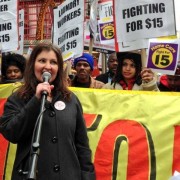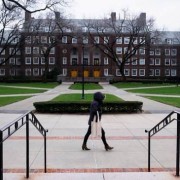Intellectuals have an obligation to bring what they learn to a wider audience. They also have an obligation to listen to the general public and learn how everyday people view the world.
This morning, I was struck with yet another reminder that the jaws of fascism continue to close upon American society. Police in Marion, Kansas, raided a local newspaper office, seizing computers, cell phones, and even the company’s internet router. The report reads like something coming right out of Putin’s Russia. If you don’t like what the reporters write, then censor them and seize the tools of their trade.
Attacks on a free press are similar to the ongoing attacks on academic freedom—they serve to undermine the fundamental values of a free society by vilifying those who speak out with viewpoints some dislike.
Earlier this year, Boaventura de Sousa Santos wrote an important article noting that there is a deafening silence among many intellectuals about the growing number of global threats, such as attacks on democracy in Europe and the increasing normalization of war. As de Sousa Santos notes, intellectuals have no monopoly on culture, values, or truth, even if they often claim to have deeper insights into these things than mere mortals. But from his perspective, they are obligated to speak out.
While I’m unconvinced that intellectuals are quite as silent as de Sousa Santos claims, he does have a point. In many areas, intellectuals are simply not raising their voices loudly enough.
One of the most important of these is the area of academic freedom, attacks upon which continue in subtle and crude ways. For example, a few years ago, a conservative group in the US created something they call the Professor Watchlist, which is aimed at outing “radical” professors and putting them on public display.
It certainly fits into the “crude” category in part because most of the “descriptions” of the radicalism of professors on the list are wildly inaccurate. Although some intellectuals listed spoke out against this, I was surprised at the time because very few university administrators had much of anything to say.
And this brings me to the issue I want to discuss here. It’s not just a good idea for intellectuals to speak out on issues—they have an obligation to do so. Why? Because their work as academics isn’t just about pursuing personal interests related to research and teaching. It’s also about building and strengthening the basic foundations of a free society that enables research and teaching without interference.
In fact, although I doubt many academics will see it this way, the ability to get a PhD is a luxury item. If you think about this a bit, the reasons become clear. We live in a world characterized by vast poverty. As of March 2023, the estimated number of people living in poverty on Earth was 659 million, or about 9% of the world’s population living on less than $2.15 per day.
Close to 24% of the world’s population—1.9 billion people—lives in fragile contexts associated with impoverishment or conditions like environmental degradation. This number is expected to increase to over 50% by 2030. About 63% of people over age 15 on our planet live in extreme poverty and have no or little education.
In an environment like this, having the opportunity to study and think for four or five years in the natural sciences and maybe as much as ten years in the humanities have much in common with the ability to buy a Mercedes. Most people not only cannot attain it, but they cannot even aspire to attain it.
That is why intellectuals have an obligation to speak out—they owe it to the society that gave them the means to spend several years living a life of intellectual leisure. I know. Many of you are angrily responding, “Graduate school was hard work for little pay!” Yes, it was. But that was nothing compared to trying to survive on $2.15 daily.
The simple fact is that you live in a society that can absorb the costs associated with having a large number of people engaged in years of study with the idea that, eventually, they will produce something of value to that society. And that’s why intellectuals have an obligation to speak out.
They have been given an opportunity to pursue knowledge by the society in which they live, and they owe it to that society to produce something of value. That can be research and teaching, but it also should involve regular commentary about the basic values that allow individuals to pursue truth in the first place—academic freedom and free speech.
Note to Conservatives: “Something of value” does not mean arguments that support preconceived notions and conservative values. It means an open critique of society as a means of identifying those things that work and those that don’t and ongoing questioning of anything that undermines tolerance for diversity of people and ideas.
All intellectuals have an obligation to speak out in support of values like academic freedom, although this is only one example among many that need numerous voices. But the ones with the strongest obligations are the leaders—the academic administrators such as provosts and university presidents—who have a moral obligation to protect intellectual communities and associated core values of free expression of ideas.
When something like a Professor Watchlist comes out or a local police department seizes a newspaper’s computers, university leaders must clarify that these actions undermine freedom for everyone. They should do this even if it risks angering politicians who have little respect for values like academic freedom. Why? Defending those who work at institutions of higher learning is also defending democracy as a whole.
Note that I did not say defending the institutions. That matters.
But the most important thing is to defend the rights of those who work and teach at those institutions to express their ideas freely and openly. The most important job of a university administrator is not to get money for the institution, nor is it even to protect the institution itself. It is to protect the intellectual community and the rights of those who belong to it to pursue truth and express their ideas openly and freely—without risk of reprisal.
We are fortunate to live in a society that can support intellectual communities with an ongoing critique of that society. But the existence of such communities also implies an obligation of everyone involved to publicly defend intellectual freedom and the rights of people to have differing and conflicting ideas and opinions. In other words, if you are an intellectual, you shouldn’t spend your career just talking to other intellectuals. You have an obligation to engage the general public and bring what you learn in your studies to a wider audience. And that engagement means you also have an obligation to listen to the general public and understand how those who have not had the luxury of a life of study view the world.
________
The cover graphic is reprinted courtesy of Inside Higher Education.




This is excellent!!! Great work John!!! And big thanks to FutureU for posting this great piece!!!